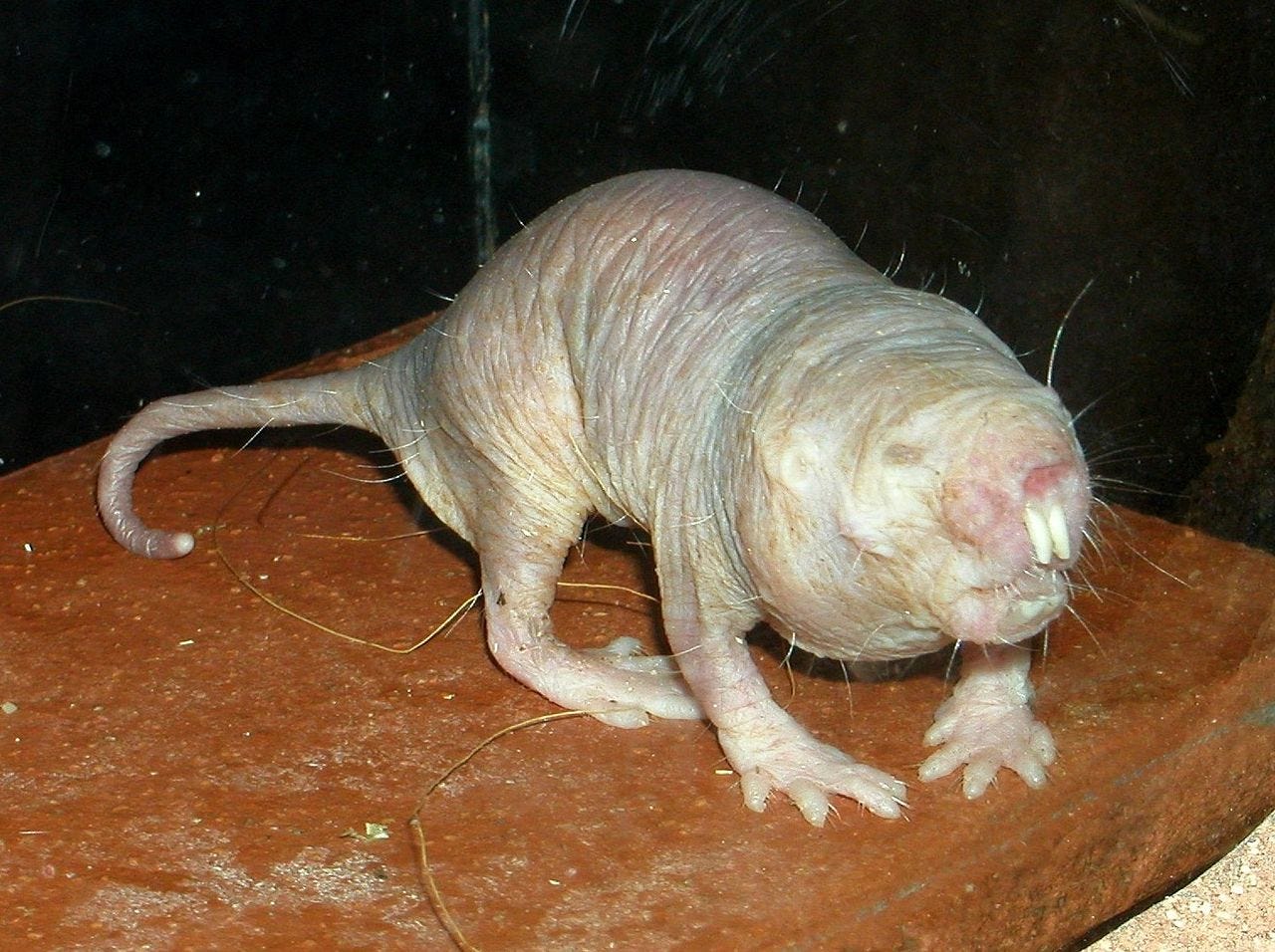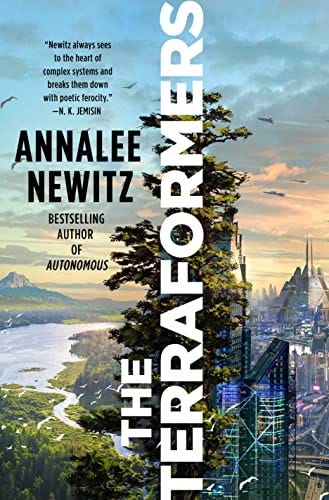The Weekly Anthropocene Reviews: The Terraformers by Annalee Newitz
A The Weekly Anthropocene Book Review
The Terraformers, by Mx.1 Annalee Newitz, is an epic science fiction novel telling the thousands of years-long, generation-spanning story of the terraforming of the planet Sask-E2. Mx. Newitz is an award-winning polymathic writer specializing in “science, culture, and the future.” Among other accomplishments, they are the author of an array of science fiction short stories and novels, a multitude of nonfiction science journalism articles, some great nonfiction books (this writer greatly enjoyed reading their fascinating Four Lost Cities, a history of Angkor, Cahokia, Pompeii, and Çatalhöyük) and an excellent science newsletter, The Hypothesis. They’re also an editor, podcaster, and more!
Even with such a record, this book is perhaps Mx. Newitz’s most ambitious project yet. The Terraformers has testimonials from an array of superb Hugo Award-winning sci-fi authors, from N.K. Jemisin to Martha Wells to Kim Stanley Robinson, so this writer’s expectations were high. They were amply exceeded.
The saga of The Terraformers takes place over 50,000 years in our future, in a multiplanetary civilization founded on “the Grand Bargain,” an accord between humans, AI, and animals formed in the aftermath of the late-Anthropocene “Farm Revolutions,” Grand Bargain species recognize each others’ intelligence, help animals to communicate via brain implants and/or genetic engineering, and manage planetary ecosystems together. An ancient tome from this time called Environmental Rescue Team Handbook is quoted like the Bible or Quran, with lines like “Your only job is to keep everything in balance,” and inspires an eponymous ancient order of “ERT” rangers who try to follow its precepts3.
The planet Sask-E is terraformed over millennia, with three key periods in its history focused on in The Terraformers, and from the beginning, this sense of post-climate change, “lessons learned from Earth” multispecies culture shapes everything. Digital technology on Sask-E has completely merged with the nascent biosphere. The Internet and the ecosystem are functionally indistinguishable. Micro-sensors embedded in seemingly every living thing send text alerts about nutrient imbalances and plant health while routing video calls through wildflowers. Rangers with the appropriate body modifications can push their hands into the soil and directly interface with all of this, which sounds like an awesome techno-superpower4. This writer would love to be able to directly interface with trees!

Animal species that are part of the Grand Bargain have genetic and/or cybernetic modification that allow them to communicate with humans and robots, which gives the settlements of Sask-E a brilliantly multitudinous feel, like a grittier, more cyberpunk version of Disney’s Zootopia. In The Terraformers, earthworms play video games as honeybees. Packs of wild dogs maintain secret rebel tunnel networks. Naked mole rats work with bots to analyze magma flow patterns. Raccoons argue over gas chromatograph results. A cat becomes a brilliant investigative journalist whose intrepid reporting of corporate malpractice changes the history of Sask-E. Moose serve as flying “aeronaut” rangers. A sentient flying train volunteers to help refugees. (And it’s a multispecies train, with little cylinders of earth for worms and boxes for cats!).
The rest of the book builds on this techno-naturalist milieu, making environmental science concepts the core of the narrative. There’s an epic sci-fi battle, with orbital laser strikes and drone fleets, fought over the course of a river and the resulting water rights. The fact that Sask-E has no natural plate tectonics becomes a key plot point. And nowhere but The Terraformers could the line “This is not a savannah…It’s a boreal forest” serve as an action-hero style one-liner before shooting someone. This kaleidoscopic style makes The Terraformers brilliantly engaging and rewarding if you have the slightest interest in earth science and the natural world, and incredibly engaging and rewarding if you’ve studied such subjects for a while.
Despite all this amazing technology and deeply rooted cultural environmentalism, the world of this book is far from a utopia. The Terraformers has extremely compelling and genuinely unsettling villains, mostly associated with a pair of amoral multiplanetary corporations that pay lip service to ERT-style pieties while reinventing as many ancient horrors as they can get away with on their new playground of Sask-E, up to and including slavery and mass murder. There’s a certain eldritch-horror creepiness created by the juxtaposition of amoral corporate office politics and century-scale ecological and societal changes, in a world of technologically enhanced near-immortality where individual corporate execs can plan for and expect to see through centuries of change in a planet’s ecologies and cultures. Stuff like (paraphrasing/muddling a bit here to avoid giving away too much plot) “that rebel minority may have won this battle but they’ll inevitably be crushed by the growing wave of settlers before the millennium is out, it’s not worth it to keep fighting them” or “we might as well let them set up a government, they’ll be better workers to set up the planet’s ecosystems if they feel like they’re in control of their own destiny, we can exert brutal control a few generations later when the big land buyers come in.” One particularly horrifying mechanic is the “limiters,” in which people (in this universe, humans, animals, or bots) created by malevolent corporations have their brains or communication implants modified with an artificially limited vocabulary, so that they can only talk about their jobs or speak in monosyllables. That was so deeply creepy that this reader had to set the book aside for a while and come back to it. Hopefully it becomes a “self-defeating prophecy,” as some have called Orwell’s 1984 and the warnings of the Y2K crisis, in which a science-fictional imagining of a bad future becomes well-known enough that large numbers of people actively work to prevent it from ever happening.

So, The Terraformers is definitely R-rated, between technologically imposed casteism/slavery, intense battle scenes, and (on the nicer side) several adult romance arcs5. But even in its darker moments, it inventively returns to one of its core themes: the inextricable melding of human civilization and technologies with other forms of Earth-descended life. For example, in the growing cities of Sask-E, supertall skyscrapers are grown from genetically engineered plants, a biotech idea that has emerged in several previous workers of speculative fiction. In The Terraformers, a malevolent company decides to “clear-cut” these skyscrapers, rhetorically melding the real-world issues of deforestation and eviction. On what feels like every page, there’s some little detail that makes you go “huh, I never thought of that before.” That’s really impressive!
If you want to read The Terraformers the first two chapters are available free on Tor.com, it’s available to buy online after January 31, 2023, and a library near you may have it as well. It’s really good, mind-expanding sci-fi, and a lot of fun to read! The Weekly Anthropocene recommends it.
Presumably named after Saskatchewan, an important place in the backstory of the novel’s future history.
An interesting bit of realism is that different ERT teams have differing interpretations, are often at odds, and are sometimes co-opted by local power structures, which seems pretty on-point given the history of comparable real-world religious/philosophical movements.
(There is an unsettling plot point later on discussing the dangers of nefarious entities accessing such intimate data, though).
There’s a romance between the cat investigative journalist and the sentient train activist! And it is genuinely sweet.





Ok, I received my copy of Terraformers from Amazon and am reading it avidly. It's great! Thx for the heads up.
Thx Sam! I just ordered a copy from Amazon copy and will have it Friday! I also would like to put in a plug for Adrian Tchaikovsky's Children of Ruin series which also deals with sentient Earth species on distant planets. He has done a lot of evolutionary/biological sci fi of a high quality!